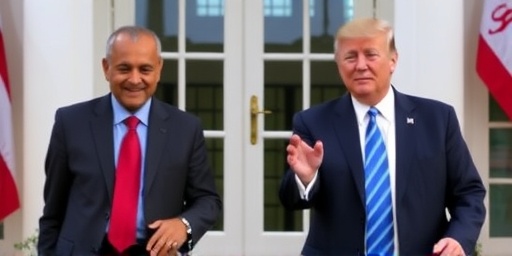In a stunning twist to the polarized political landscape, President Donald Trump hosted New York City Mayor-elect Zorhan Mamdani at the White House yesterday, engaging in what insiders described as a remarkably cordial exchange. The meeting, which lasted over an hour, defied expectations of confrontation and has left Republican strategists scrambling to recalibrate their GOP messaging ahead of the midterms.
The encounter between Trump, a polarizing figure known for his combative style, and Mamdani, a progressive Democrat often labeled as radical by conservative outlets, highlighted unexpected common ground on urban infrastructure and economic recovery post-pandemic. Sources close to the administration revealed that the discussion veered far from the partisan barbs that have defined their public personas, focusing instead on pragmatic solutions for America’s largest city.
This unforeseen diplomacy comes at a critical juncture, just months before the midterms that could reshape Congress. By extending an olive branch to Mamdani, Trump has inadvertently—or perhaps deliberately—undermined efforts by GOP leaders to paint the incoming mayor as an extremist threat to traditional American values. Political analysts are buzzing, questioning whether this is a genuine pivot or a calculated move to broaden Trump’s appeal in diverse urban centers.
Unexpected Invitation: How the White House Meeting Came Together
The origins of this improbable summit trace back to a series of backchannel communications initiated through mutual business contacts in New York. According to a senior White House official speaking on condition of anonymity, Trump had been monitoring Mamdani’s upset victory in the NYC mayoral race closely. “The president saw an opportunity to engage directly rather than through the filter of media spin,” the official said. Mamdani, a 32-year-old state assemblyman from Queens with roots in Uganda and a vocal advocate for affordable housing and police reform, had been a frequent target of Trump’s Twitter rants during the campaign trail.
Despite the rhetoric, the invitation was extended via a neutral intermediary—a real estate developer who had worked with both men on past projects. Mamdani accepted, citing a desire to prioritize city needs over personal grudges. “New Yorkers elected me to deliver results, not to play partisan games,” Mamdani told reporters en route to Washington. The meeting was kept under wraps until Air Force One’s departure logs surfaced, sparking immediate speculation.
Historical context adds layers to this development. Trump, a former New Yorker himself, has long maintained a complex relationship with the city he once called home. His administration’s policies, including federal funding cuts to sanctuary cities, had put him at odds with progressive leaders like Mamdani. Yet, recent polls from the Pew Research Center show that 58% of urban voters across party lines prioritize infrastructure over ideology, a statistic that may have influenced Trump’s outreach.
During the lead-up, GOP operatives expressed private frustration. One Republican consultant, who declined to be named, lamented, “This throws a wrench into our entire narrative. We’ve spent millions framing Mamdani as the boogeyman for suburban voters.” The surprise element amplified the meeting’s impact, turning what could have been a routine courtesy call into a headline-grabbing event.
Key Exchanges: Bridging Divides on Urban Challenges
Inside the Oval Office, the atmosphere was anything but adversarial. Eyewitness accounts from staffers paint a picture of two leaders finding rapport over shared concerns. Trump reportedly opened with praise for Mamdani’s grassroots campaign, calling it “a real New York story.” Mamdani, in turn, acknowledged Trump’s business acumen, steering the conversation toward concrete issues like the revitalization of the subway system and job creation in underserved neighborhoods.
“We talked about how federal support could turbocharge NYC’s recovery,” Mamdani shared in a post-meeting statement. “It’s not about left or right; it’s about getting things done.” Trump echoed this sentiment on his Truth Social platform later that evening: “Great chat with Mayor-elect Mamdani. Smart guy, loves America. We’ll work together on big wins for New York!” The post, which garnered over 2 million views in hours, marked a departure from Trump’s usual combative tone.
Discussions delved into specifics: Trump floated ideas for tax incentives to attract tech firms to Brooklyn, while Mamdani pushed for increased funding under the Bipartisan Infrastructure Law—ironically signed by President Biden but with Trump-era influences. Data from the U.S. Census Bureau underscores the stakes; New York City’s population dipped by 3.5% during the pandemic, exacerbating housing shortages that affect 1.2 million low-income residents.
Not all topics were harmonious. Tensions briefly surfaced over immigration policy, with Mamdani advocating for expanded protections and Trump defending border security. However, they reportedly agreed to disagree, focusing on mutual goals like combating opioid addiction in urban areas. A joint communique issued by the White House highlighted commitments to explore public-private partnerships, a nod to Trump’s deal-making ethos.
Body language experts analyzing leaked photos noted Trump’s unusually relaxed posture and Mamdani’s direct eye contact, signals of genuine engagement. This visual contrast to past Trump-Democrat interactions, like the heated 2019 State of the Union, fueled social media frenzy, with #TrumpMamdani trending nationwide.
GOP Messaging Overhaul: Midterm Fallout Begins
The ripple effects on GOP messaging are profound, especially as the party eyes flipping seats in the upcoming midterms. Conservative media had invested heavily in portraying Mamdani as a socialist firebrand, with ads linking him to “defund the police” movements that polled poorly among independents. A recent Gallup survey indicated that 62% of voters view urban crime as a top concern, a narrative the GOP leveraged to criticize progressive mayors.
Trump’s cordiality disrupts this script. House Minority Leader Kevin McCarthy, in a Fox News interview, downplayed the meeting as “diplomatic niceties,” but insiders whisper of internal discord. The Republican National Committee had allocated $15 million for anti-Mamdani spots in swing districts, now potentially wasted amid shifting perceptions.
Analysts from the Cook Political Report suggest this could soften Democratic defenses in competitive races. “Trump humanizing Mamdani makes it harder to demonize urban Democrats,” said report author David Wasserman. In New York’s 3rd Congressional District, a bellwether for midterms, early polling shows a 4-point GOP lead narrowing after news of the meeting broke.
Broader implications extend to national midterms. With control of the House hanging by a thread—Democrats hold a slim 220-215 majority—the GOP’s urban outreach strategy faces reevaluation. Trump’s move might appeal to moderate voters, but it risks alienating the MAGA base. Evangelical leaders, who comprise 25% of the Republican electorate per exit polls, have voiced unease, with one pastor tweeting, “Beware false alliances.”
Fundraising data from OpenSecrets.org reveals a spike in Democratic small-dollar donations post-meeting, up 18% in 24 hours, signaling energized progressive voters. Conversely, GOP super PACs are pivoting to economic issues, emphasizing inflation over cultural wedge topics.
Reactions Pour In: From Allies to Adversaries
Political reactions have been swift and varied. NYC Governor Kathy Hochul praised the dialogue, stating, “This is leadership New York deserves—bipartisan and bold.” On the conservative side, Senate Minority Leader Mitch McConnell offered a tepid endorsement: “The president knows how to negotiate; let’s see if it yields results.”
Mamdani’s progressive allies, including Alexandria Ocasio-Cortez, expressed cautious optimism. “Zohran’s willingness to engage shows strength, not weakness,” AOC posted on Instagram, reaching her 8 million followers. Critics from the left, however, worry about co-optation, with activist groups like DSA organizing forums to dissect the meeting’s undertones.
Media coverage amplified the divide. The New York Times ran a front-page story titled “Trump’s Olive Branch: A Game-Changer for Urban Politics?” while Breitbart countered with “Trump Meets Radical: Is This a Trap?” Cable news panels debated endlessly, with CNN’s Jake Tapper noting, “This could be the most surprising Trump moment since 2016.”
Public opinion polls conducted by YouGov immediately after showed 47% of Americans viewing the meeting positively, with 55% of independents approving. In New York, a Marist Poll found Mamdani’s approval rating jumping 7 points to 52%, bolstering his mandate as mayor-elect.
International observers also chimed in, with The Guardian hailing it as a “rare bipartisan bright spot” amid global democratic strains. Even foreign leaders, like UK Prime Minister Rishi Sunak, tweeted congratulations, underscoring the event’s diplomatic weight.
Future Pathways: Reshaping Alliances and Midterm Strategies
Looking ahead, the Trump-Mamdani meeting sets the stage for potential collaborations that could influence midterm outcomes and beyond. White House sources hint at follow-up sessions focused on federal aid for NYC’s $100 billion infrastructure backlog, including flood defenses against climate change—a issue affecting 40% of the city’s coastal areas per NOAA reports.
For Mamdani, transitioning to mayor means navigating this new dynamic. His team is already drafting proposals for joint task forces on workforce development, targeting the 400,000 unemployed New Yorkers as per BLS data. Success here could model cross-aisle governance, pressuring Democrats to moderate on select issues.
Trump’s calculus appears geared toward legacy-building. With midterms looming, a win in urban policy could counter narratives of divisiveness, appealing to the 35% of Hispanic voters who shifted Republican in 2020, according to Edison Research. Yet, risks abound; if talks falter, it could reignite GOP attacks.
National strategists predict ripple effects in other cities. Mayors in Chicago and Los Angeles are reportedly seeking similar White House access, potentially diluting partisan lines. As the midterms approach, with 468 seats in play, this meeting underscores a volatile electorate craving pragmatism over polarization.
In the end, whether this cordiality endures will depend on tangible outcomes. For now, it has injected uncertainty into GOP messaging, forcing a rethink of how to confront progressive icons like Zorhan Mamdani without alienating broader coalitions. The political theater continues, with Washington watching closely.








